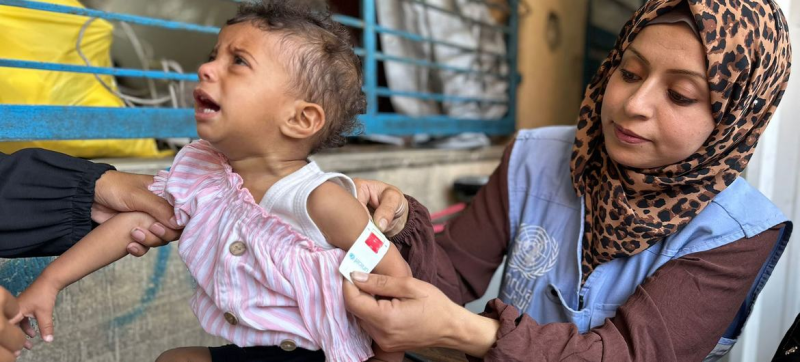- India Sees 9% Drop in Foreign Tourists as Bangladesh Visits Plunge |
- Dhaka Urges Restraint in Pakistan-Afghan War |
- Guterres Urges Action on Safe Migration Pact |
- OpenAI Raises $110B in Amazon-Led Funding |
- Puppet show enchants Children as Boi Mela comes alive on day 2 |
Gazans Dying for Food Amid Rising Hunger and Aid Blockades

An UNRWA worker in Gaza checks a child for signs of malnutrition.
Humanitarian needs in the Gaza Strip "have never been higher" while the ability to assist the population "has never been more constrained," said Carl Skau, Deputy Executive Director of the World Food Programme (WFP), during a press briefing in New York on Friday.
"The fact that people are now dying every day trying to get food is the starkest illustration of how desperate the situation is," Skau said after returning from his fourth visit to the war-ravaged enclave.
Earlier this year, food security experts reported that starvation was spreading in Gaza. The entire population—around two million people—is acutely food insecure, with half a million on the brink of famine.
"If anything, it's much worse now," said Skau, who recently visited Gaza City, Deir Al-Balah, and Khan Younis.
Malnutrition is also surging. According to UNICEF, around 90,000 children urgently need treatment. Today, one in three people goes hungry for days. Skau said he met families who told him there are days when their children do not eat at all.
"But even when they do, it's often just hot soup with a few lentils or some pasta—clearly not enough," he added. Some mothers are even discouraging their children from playing to conserve energy.
Skau also highlighted the extent of displacement. In the past, families were displaced two or three times. Now, he said, "I meet families who have moved two or three times in just the past 10 days," and some have been uprooted more than 20 times.
Despite a brief lift of the recent 80-day aid blockade, the humanitarian response remains severely constrained. The assistance currently reaching Gaza is only a fraction of what is needed. A kilo of wheat flour now costs $25.
“The operating environment is just impossible,” Skau said. Active military operations are ongoing in about 85% of Gaza's territory. Humanitarian teams often spend 15 to 20 hours in armoured vehicles waiting at checkpoints for clearance.
Other obstacles include shortages of fuel, spare parts, and basic communications equipment.
Skau said the WFP has been actively engaging with Israeli authorities in recent weeks. There were commitments on increasing aid volumes, improving humanitarian movement, and avoiding Israel Defense Forces (IDF) presence during aid convoys.
“But the proof is in the pudding,” he said. “We now need to see delivery and implementation. So far, there has not been enough progress.”
WFP was allowed to deliver aid through northern Gaza on Friday for the first time in several days, which he called “a key issue.”
"It's not just about volumes, but also about accessing the north, where aid can be distributed in a more orderly manner," he said.
Skau acknowledged the presence of armed groups interfering in the area, calling it unacceptable, but stressed the need to deliver aid there to help reduce desperation and prices.
Skau warned that the limited progress is not enough to reverse the hunger crisis and reiterated the urgent need for a ceasefire.
During the earlier ceasefire, WFP facilitated the entry of over 8,000 trucks, opened 25 bakeries and hundreds of soup kitchens, and provided food for more than 1.5 million people.
The agency was also able to stock warehouses, allowing operations to continue during much of the 80-day blockade.
“We are ready to do that again,” said Skau. “We have enough food at the borders to supply the entire population for two months. But we need a ceasefire and the conditions to deliver.”
He emphasised the need for a humanitarian protocol with provisions for multiple entry points and a secure delivery environment.
Asked about talks with Israel, Skau said, “I sensed a recognition that conditions need to improve. It was also acknowledged that the UN has a key role to play.”
He added, “It was clear in my discussions that they want the UN to remain the main delivery channel. And if there is a ceasefire, the indication was that they want us ready—just like last time, when we brought in 600 trucks on Day One.”

